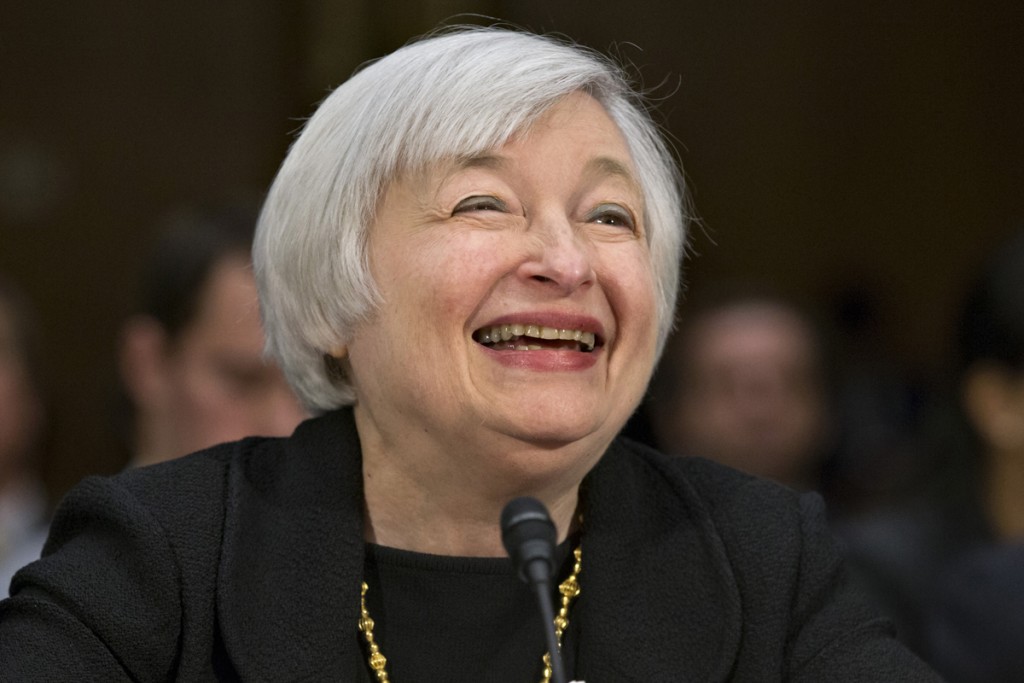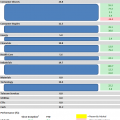Submitted by Pater Tenebrarum via Acting-Man blog,
Is Inequality a Bad Thing?
We couldn’t believe what we were seeing when coming across the following headline at Reuters recently: “Fed’s Yellen says research needed to understand inequality issue”. Seriously? Maybe we can help the good chairwoman out a bit. First of all, human beings are already born unequal. With that we not only mean that they are born in different social strata, but that they are usually born with unequal talents, brains, physique, and so forth.

Fed chair Janet Yellen – she doesn’t look concerned here, but of course we don’t want her to constantly wear a frown. Anyway, inequality is on her mind she says.
Photo credit: AP
In that sense, inequality is not an “issue”, but simply a fact of life. Ms. Yellen refers of course specifically to inequality in incomes and wealth. This has been an “issue” for etatistes of all stripes for a very long time. However, one must ask: why should it be an issue, if not for envy? Socialism thrives on envy. Its message to its supporters is basically: your fellow men don’t deserve to be wealthier than you are. Therefore, their wealth should be taken from them by force, and distributed “justly”. In actual practice, we usually find that the political representatives of socialism are enjoying capitalist luxuries which will forever remain out of reach for most members of their target audience.
All political ideologies have one thing in common: they promise their supporters that they will provide them with greater material wealth. The problem with socialism is that it cannot possibly keep that promise – sooner or later, socialists will “run out of other people’s money”, as Margaret Thatcher is said to have put it once. This happens all the sooner the more pressure government puts on those with higher incomes and greater wealth. It shouldn’t be too difficult to see why that is the case. At some point those who generate wealth will simply stop doing so, because making the effort no longer seems to pay.
Inequality remains a hot-button issue though, as the rich keep getting richer, while the middle class and the poor are these days not just treading water, but are effectively getting poorer. Obviously, an increase in inequality could not possibly be considered a “problem” if everybody was gaining in material wealth. Why should a man who earns $120,000 this year compared to $100,000 he made in the previous year be concerned about some millionaire he doesn’t even know increasing his earnings even more? Obviously, apart from sheer envy, he would have no reason to be worried at all. The only thing that should be important to him is whether the possibility to become a millionaire exists for him as well. Unequal wealth and incomes in fact are an incentive for some people to try to achieve more than the average man, which in turn will tend to improve the economy and standards of living for all.
This latter fact is often overlooked, but George Reismann has made an effort to explain it in an essay entitled “In praise of the capitalist 1 percent”. As Reismann notes:
“[…] in the modern world in which we actually live, the wealth of the capitalists is simply not in the form of consumers’ goods to any great extent. Not only is it overwhelmingly in the form of means of production, but those means of production are employed in the production of goods and services that are sold in the market. Totally unlike the conditions of self-sufficient farm families, the physical beneficiaries of the capitalists’ means of production are all the members of the general consuming public who buy the capitalists’ products.
[…]
The benefit of the capitalists’ means of production to non-owners of means of production extends not only to the buyers of the products of those means of production but also to the sellers of the labor that is employed to work with those means of production. The wealth of the capitalists, in other words, is the source both of the supply of products that non-owners of the means of production buy and of the demand for the labor that non-owners of the means of production sell. It follows that the larger the number and greater the wealth of the capitalists, the greater is both the supply of products and the demand for labor, and thus the lower are prices and the higher are wages, i.e., the higher is the standard of living of everyone.”
(Italics in original, bolding added)
In short, there is nothing bad about inequality as such. Reismann does however also make the point that these considerations do not apply to wealth that has been gained by force through government privileges or other government interventions:
“Of course, this does not apply to wealth that has been acquired by such means as obtaining government subsidies or preventing competition through protective tariffs and other forms of government intervention. These are methods that are made possible to the extent that the government is permitted to depart from a policy of strict laissez-faire and thereby arbitrarily reward or punish firms.”
This brings us to Ms. Yellen and the “research” into inequality she believes is required.
Statist Mumbo-Jumbo
As Reuters informs us:
“More research is needed to understand what policies allow people to move up the economic ladder and what holds them back, Federal Reserve Chair Janet Yellen said on Thursday, returning to a controversial topic for the U.S. central bank.
Yellen said that research may provide evidence of what allows people to get ahead, and to predict how individual circumstances impact income inequality.
“It would also be beneficial to understand whether any policies may hold people back or discourage upward mobility,” Yellen said in prepared remarks for a speech to a Fed research conference here on economic mobility.
Yellen tackled the issue of income inequality in a speech in Boston last October, saying she was “greatly concerned” about income disparity in the United States.”
(emphasis added)
We repeat that there is absolutely no need for her to be concerned about “income disparity” as such. What is worth being concerned about is the fact that the income and wealth of most people is actually stagnating and even declining, while those who are already rich keep getting richer even if they don’t lift a finger.
No research is required to find out what exactly is holding people back. If we wanted to remove obstacles to social mobility, “a policy of strict laissez-faire” as Mr. Reismann has formulated it should do the trick. It is quite ironic that Ms. Yellen expresses so much concern about inequality given that she heads the very institution that is the main reason for the increase in income inequality. The necessary research has been done by Richard Cantillon in the 18th century already. There is definitely no need to pay anyone for yet another investigation into the matter.
Newly created money always enters the economy at discrete points. This means that some members of society will gain new purchasing power before others, without having to contribute any real savings to the economy, or having to borrow real savings from others. They can exercise a claim on goods and services before their prices react to the presence of additional money. As this money spreads outward in a wave-like movement, prices will adjust – and the later receivers of new money, and/or those who don’t receive it at all, will necessarily lose out. In other words, the Federal Reserve’s policy of money supply expansion creates winners and losers – with the latter the great majority of people, whose real incomes are declining.
Hello Ms. Yellen – we’ve got your research right here – click to enlarge.
The chart above shows that since the year 2000, the broad us money supply has more than tripled – in fact, it has almost quadrupled. All of the additional money created in that time was created ex nihilo – i.e, literally from thin air. This has enabled countless exchanges of nothing (new money) for something (real goods and services) to take place. Not only has wealth been redistributed on a grand scale in this manner, but the economy has suffered an untold amount of structural damage, as scarce capital has been malinvested and ultimately consumed.
Obviously, it would be very easy to change this: just stop printing money, for starters. However, that is certainly not what today’s establishment figures have in mind. We have noticed that if they have already made so much money that they never need to worry again about making another dime and have the leisure to come up with their personal social engineering plans, they are often brimming with recommendations. However, we rarely hear one of them recommend that it would be best to simply leave people alone. A recent example of this was provided by famous ex-PIMCO CEO and co-investment head Mohamed El-Erian. It all sounds good until he gets to “what should be done”:
“In a wide-ranging interview, El-Erian discussed topics ranging from the global economy to the rise of inequality in the United States [uh-oh, ed.], his personal financial portfolio and his love of Twitter.
Q. You are speaking Tuesday at an event focusing on economic inequality. Why?
A. Income inequality has risen so much that consumption as a whole is undermined. That’s because rich people have a much lower propensity to consume than poor people. But it is the rich people that have captured all the income growth for the last seven years. A little bit of inequality is good for the system because it creates incentives. A lot of inequality actually creates negative economic effects. It has become an inequality of opportunity.
Q. What should be done?
A. The government should be using fiscal policy – taxing the rich more and supporting the sectors that are critical to equality of opportunity: like education and health.
(emphasis added)
Apparently, to El-Erians mind, there is nothing that could possibly be done that doesn’t involve the government doing something. As Bill Bonner recently asked: haven’t they done enough already? The government as a rule botches everything it touches. Education and health? Government efforts with respect to education have so far brought about an abysmal failure of a school system that produces a stunning number of functionally illiterates, as well as the greatest mountain of student debt in history. One would think the best thing for the government to do would be to remove itself as far as possible from the field of education. It would probably be best if it were to butt out altogether.
Health? There has already been a giant move toward even more health socialism under the current administration, which one of its chief architects openly admitted was pushed through in the most fraudulent manner possible, by exploiting “the stupidity of the American voter” (see “Dr. Gruber, Wie Geht’s Dir?” for details). And now El-Erian wants the government to do even more? What makes him think that any improvement can possibly be expected?
And of course, he could not fail to mention the old chestnut of “taxing the rich”. That will surely make things better! The rich already pay the vast bulk of taxes. The top 20{01de1f41f0433b1b992b12aafb3b1fe281a5c9ee7cd5232385403e933e277ce6} of income earners in fact pay almost 68{01de1f41f0433b1b992b12aafb3b1fe281a5c9ee7cd5232385403e933e277ce6} of all taxes. What will taxing them even more do? It will only furnish politicians with more money to waste and buy votes, that’s what.

The top 20{01de1f41f0433b1b992b12aafb3b1fe281a5c9ee7cd5232385403e933e277ce6} of income earners make 50.8{01de1f41f0433b1b992b12aafb3b1fe281a5c9ee7cd5232385403e933e277ce6} of total income, but pay 67.9{01de1f41f0433b1b992b12aafb3b1fe281a5c9ee7cd5232385403e933e277ce6} of all taxes.
The idea that more intervention by the State is needed to solve our problems is deeply ingrained with members of today’s intelligentsia. Undeterred by failure after failure, they all plead for more rather than less government. El-Erian, perhaps not surprisingly, is writing a book about central banks. Here is what he says about this effort. Once again, after delivering a reasonably correct analysis of the current situation, it comes down to pleading for more government interference again when he gets to the “what should be done” stage:
Q. Why write a book on central banks?
A. This is a historic period in which central banks are the only game in town when it comes to policy. But central banks do not have the tools to deliver what the global economy needs. We need more potent reinvigorated growth models.
The West fell in love with the wrong growth models 10 years ago. It fell in love with finance as an enabler of prosperity. The whole society fell in love with leverage and credit as a way of prospering. We were entitled to accumulate debt! People bought homes they could not afford. Governments borrowed money that they could not pay back. Regulators believed that finance was so sophisticated that you could lessen regulations on it. This romance with the wrong growth model fell apart in 2007 and 2008.
Q. Now what?
A. We are struggling to find a new growth model because the political system hasn’t stepped up to its responsibilities. Obvious things like investing in infrastructure at extremely low interest rates are not being done. The reform of corporate taxation. The reform of labor markets – retraining workers, developing apprenticeships through public-private partnerships.
Either governments and politicians and companies will step up to their economic governance responsibilities and we will turn to something sustainable or, if we don’t, then you will have low growth and financial instability.
Q. How would you fix this?
A. We need a Sputnik moment. Like when we woke up to a satellite being launched successfully [by the Soviet Union in 1957] and our country came behind a vision and there was a unity of purpose. What we desperately need is an economic Sputnik.
(emphasis added)
So we need an “economic Sputnik” to really galvanize government and the bureaucracy! We wonder, does he perhaps have something in mind akin to what the WTC attack did for the funding and power of the Deep State and its surveillance apparatus? When it comes to government, nothing reaps greater rewards than utter failure.

Another unreconstructed etatiste: Mohamed El-Erian
Photo credit: Reuters
Conclusion
Whether today’s most feted “intellectual leaders” and policy makers are correctly diagnosing problems or misdiagnosing them, their proposals are never anything but “viciously statist” to paraphrase Hans-Hermann Hoppe. They seemingly don’t realize that economic freedom is the sine qua non for personal freedom. One simply cannot have the latter without the former.
None of them seem to believe that people can be trusted to be in charge of their own affairs. The debate over the “inequality problem” is an excellent case in point. It isn’t as if the knowledge required to understand the problem weren’t readily available. However, most of these people were educated in statist institutions, and have rarely been exposed to any non-statist ideological viewpoints. The possibilities offered by solutions that do not involve the State in every nook and cranny of the economy and our daily lives don’t even occur to them. And of course, the best social engineering plans are always their personal ones.
As Ludwig von Mises wrote in “The Economic Foundations of Freedom”:
What makes many people blind to the essential features of any socialist or totalitarian system is the illusion that this system will be operated precisely in the way which they themselves consider as desirable. In supporting socialism, they take it for granted that the “state” will always do what they themselves want it to do. They call only that brand of totalitarianism “true,” “real,” or “good” socialism the rulers of which comply with their own ideas. All other brands they decry as counterfeit. What they first of all expect from the dictator is that he will suppress all those ideas of which they themselves disapprove. In fact, all these supporters of socialism are, unbeknown to themselves, obsessed by the dictatorial or authoritarian complex. They want all opinions and plans with which they disagree to be crushed by violent action on the part of the government.
[…]
A man has freedom as far as he shapes his life according to his own plans. A man whose fate is determined by the plans of a superior authority, in which the exclusive power to plan is vested, is not free in the sense in which the term“free” was used and understood by all people until the semantic revolution of our day brought about a confusion of tongues.”
(emphasis added)
![]()
SOURCE: Zero Hedge – Read entire story here.




